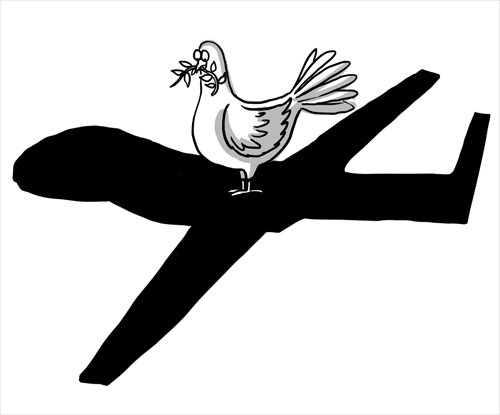HOME >> OP-ED
Yet another drone strike kills tentative hopes of peace in Pakistan
By Farooq Yousaf Source:Global Times Published: 2013-11-20 20:18:02

Illustration: Liu Rui/GT
Hakimullah Mehsud, the Pakistani Taliban head, is dead, and so is the glimmer of hope for peace in Pakistan.
It took continuous efforts from the Pakistani government to get Mehsud, and his outfit Tehrik-e-Taliban Pakistan (TTP), to express an intent to talk.
But it was yet another drone strike that dished the chance of a much needed truce in the country.
The event sparked déjà vu for those who remember 2004, when another militant leader, Nek Muhammad Wazir, was taken out in the same manner after a peace deal was brokered between him and the Pakistan army.
But even though his hands were stained with the blood of countless innocents, Mehsud's death has been openly condemned by major political parties, and their supporters, in Pakistan.
That is where Pakistan is divided into two groups.
One side thinks that irrespective of its target, any drone strike in Pakistan is illegal and breaches the country's sovereignty and that the US uses the CIA-controlled drone strikes only to further its own agenda.
The second group thinks that even though drones violate the country's sovereignty, it's only these unmanned craft that can root out terrorists such as Mehsud; and thus his death should be celebrated rather than condoned.
And seduced by the idea of "peace with the militants," the people have also failed to ask whether both the state and the militants were, or are, serious for peace.
Pakistan is still an active ally of the US in the War on Terror, and thus provides active intelligence on major US strikes on the Taliban. Or, at least, the US has time and again spoken of such an agreement, whereas Pakistan has categorically denied such claims.
The TTP has also carried on with its activities of terror, including assassination of an army general in the Frontier Regions. For TTP, the military forces of Pakistan, while entering the tribal areas, are an equal enemy to the US.
We can clearly see that the US is seldom bothered about Pakistan's ceremonial protests over drones.
So where does it leave the peace process with the TTP?
Probably at a dead end!
The selection of Maulvi Fazlullah, based in Afghanistan, as the new Taliban chief in Pakistan sends a strong signal both to the government and the people.
The blood-thirsty new leader was responsible for chaos in Pakistan's Swat region, which could lead to a full-scale military offensive.
He is also responsible for multiple attacks on the Pakistan army, killing dozens of soldiers. It was Fazlullah who ordered the attack on Malala Yousufzai, the teenager Pakistani education activist.
As for the peace talks, according to Ehsanullah Ehsan, a senior TTP leader, there are minimal chances for such talks in the near future as the Taliban have lost trust on the government. With Fazlullah in place and no sight of peace talks, Pakistan is indeed bracing for revenge attacks from the TTP.
On the other hand, the TTP, controlling multiple militant factions, is also facing the daunting task of keeping the militant factions under one umbrella due to mounting opposition over the selection of Fazlullah as the new chief.
This also leaves open the option of force for the Pakistani military at a time when the TTP is busy sorting out its internal frictions.
But if Pakistan's ruling elite is honestly aiming for peace, it needs to move forward with a clear policy put into practice. To make things easier, it can start with telling the truth on both formal and tacit agreements with the US.
Lodging mere protests against drones or surgical strikes won't help anymore. If there are hidden agreements allowing strikes in Pakistan, they should immediately be declared null and void, which might help lure militants back to the table.
Without such policy shifts, and with peace talks off the table, the never-ending cycles of blood, violence and chaos will continue.
The author is a program consultant and editor at the Center for Research and Security Studies, Islamabad. farooq@crss.pk
Posted in: Viewpoint